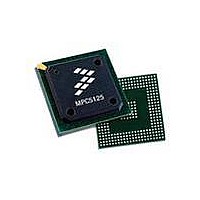MPC5125YVN400 Freescale Semiconductor, MPC5125YVN400 Datasheet - Page 215

MPC5125YVN400
Manufacturer Part Number
MPC5125YVN400
Description
IC MCU 32BIT E300 324TEPBGA
Manufacturer
Freescale Semiconductor
Series
MPC51xxr
Datasheets
1.MPC5125YVN400.pdf
(92 pages)
2.MPC5125YVN400.pdf
(8 pages)
3.MPC5125YVN400.pdf
(2 pages)
4.MPC5125YVN400.pdf
(1064 pages)
Specifications of MPC5125YVN400
Core Processor
e300
Core Size
32-Bit
Speed
400MHz
Connectivity
CAN, EBI/EMI, Ethernet, I²C, USB OTG
Peripherals
DMA, WDT
Number Of I /o
64
Program Memory Type
ROMless
Ram Size
32K x 8
Voltage - Supply (vcc/vdd)
1.33 V ~ 1.47 V
Oscillator Type
External
Operating Temperature
-40°C ~ 125°C
Package / Case
324-PBGA
Processor Series
MPC51xx
Core
e300
Data Bus Width
32 bit
Development Tools By Supplier
TWR-MPC5125-KIT, TWR-SER, TWR-ELEV, TOWER
Maximum Clock Frequency
400 MHz
Operating Supply Voltage
1.4 V
Maximum Operating Temperature
+ 125 C
Mounting Style
SMD/SMT
Data Ram Size
32 KB
I/o Voltage
3.3 V
Interface Type
CAN, I2C
Minimum Operating Temperature
- 40 C
Program Memory Size
32 bit
Cpu Speed
400MHz
Embedded Interface Type
CAN, I2C, SPI, UART, USB
Digital Ic Case Style
TEPBGA
No. Of Pins
324
Rohs Compliant
Yes
Cpu Family
MPC5xx
Device Core Size
32b
Frequency (max)
400MHz
Total Internal Ram Size
32KB
Instruction Set Architecture
RISC
Operating Temp Range
-40C to 85C
Operating Temperature Classification
Industrial
Mounting
Surface Mount
Pin Count
324
Lead Free Status / RoHS Status
Lead free / RoHS Compliant
Eeprom Size
-
Program Memory Size
-
Data Converters
-
Lead Free Status / Rohs Status
Lead free / RoHS Compliant
Available stocks
Company
Part Number
Manufacturer
Quantity
Price
Company:
Part Number:
MPC5125YVN400
Manufacturer:
Freescale Semiconductor
Quantity:
135
Company:
Part Number:
MPC5125YVN400
Manufacturer:
LTC
Quantity:
29
Company:
Part Number:
MPC5125YVN400
Manufacturer:
Freescale Semiconductor
Quantity:
10 000
- MPC5125YVN400 PDF datasheet
- MPC5125YVN400 PDF datasheet #2
- MPC5125YVN400 PDF datasheet #3
- MPC5125YVN400 PDF datasheet #4
- Current page: 215 of 1064
- Download datasheet (6Mb)
counter to limit the maximum number of consecutive transactions that are performed by masters. When
the counter expires, the arbiter ignores the REPEAT signal and falls back to the regular arbitration scheme.
See
ACR[RPTCNT].
8.3.1.3
The ARTRY protocol is used primarily by the CPU to interrupt a transaction that hits to a modified line in
its D-cache, so that it can maintain data coherency by performing the snoop copyback. In addition, any
master and/or slave can ARTRY a transaction for whatever reason.
When an address tenure is ARTRY’d, all masters must negate their bus request signals during the cycle
after ARTRY except the master that asserted ARTRY signal. The cycle after ARTRY is called WOP
(Window Of Opportunity).
During the WOP cycle, the arbiter performs the arbitration the same way as in regular arbitration cycle,
except that the parking master policy does not apply. When the CPU asserts ARTRY, the bus is
immediately granted to the CPU to perform snoop copyback. After the completion of snoop copyback, the
arbiter grants the bus back to the master that had its transaction ARTRY’d. If ARTRY was asserted by any
other master or slave, the arbiter performs the arbitration the same way as it would perform it for a regular
arbitration cycle. The master that had its transaction ARTRYed by any master or slave except CPU is put
at the end of priority list. It can be programmed to park the bus to CPU on WOP cycle or not to park it to
any master. Refer to
ACR[WPARK].
8.3.1.4
The arbiter supports address bus parking. When no master is requesting the bus, the arbiter can grant
mastership of the bus to a specified master. This is referred to as bus parking. The parked master can skip
the bus request and assume the bus mastership directly. This reduces the access latency for parked master.
See
ACR[PARKM].
8.3.1.5
For every committed address tenure except address-only or reserved-type transactions, a data tenure is
required to complete the transaction.
In the MPC5125 system, the arbiter controls the issuing of data bus grants to a master and a slave, which
are involved in a data tenure of a previously performed address tenure.
Freescale Semiconductor
•
•
Section 8.2.1.1, “Arbiter Configuration Register (ACR),”
Section 8.2.1.1, “Arbiter Configuration Register (ACR),”
In data tenure without data streaming (master or slave or both do not support data streaming), the
arbiter guarantees that the data bus grant is asserted only when the data bus is idle.
In data tenure with data streaming (both master and slave support data streaming), the arbiter
guarantees that the data bus grant is asserted when the data bus is either idle or waiting for the last
transfer acknowledge.
Address Bus Arbitration After ARTRY
Address Bus Parking
Data Bus Arbitration
Section 8.2.1.1, “Arbiter Configuration Register (ACR),”
MPC5125 Microcontroller Reference Manual, Rev. 2
for more details about programming
for more details about ACR[APARK] and
for more detail about
CSB Arbiter and Bus Monitor
8-15
Related parts for MPC5125YVN400
Image
Part Number
Description
Manufacturer
Datasheet
Request
R
Part Number:
Description:
Mpc5125 Microcontroller Data Sheet
Manufacturer:
Freescale Semiconductor, Inc
Datasheet:

Part Number:
Description:
MPC5125 Microcontroller Data Sheet
Manufacturer:
FREESCALE [Freescale Semiconductor, Inc]
Datasheet:
Part Number:
Description:
Manufacturer:
Freescale Semiconductor, Inc
Datasheet:
Part Number:
Description:
Manufacturer:
Freescale Semiconductor, Inc
Datasheet:
Part Number:
Description:
Manufacturer:
Freescale Semiconductor, Inc
Datasheet:
Part Number:
Description:
Manufacturer:
Freescale Semiconductor, Inc
Datasheet:
Part Number:
Description:
Manufacturer:
Freescale Semiconductor, Inc
Datasheet:
Part Number:
Description:
Manufacturer:
Freescale Semiconductor, Inc
Datasheet:
Part Number:
Description:
Manufacturer:
Freescale Semiconductor, Inc
Datasheet:
Part Number:
Description:
Manufacturer:
Freescale Semiconductor, Inc
Datasheet:
Part Number:
Description:
Manufacturer:
Freescale Semiconductor, Inc
Datasheet:
Part Number:
Description:
Manufacturer:
Freescale Semiconductor, Inc
Datasheet:
Part Number:
Description:
Manufacturer:
Freescale Semiconductor, Inc
Datasheet:
Part Number:
Description:
Manufacturer:
Freescale Semiconductor, Inc
Datasheet:
Part Number:
Description:
Manufacturer:
Freescale Semiconductor, Inc
Datasheet:











